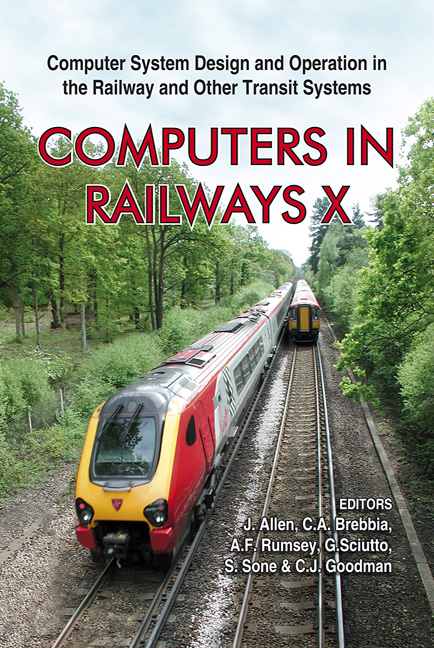Optimising Train Priorities To Support The Regulation Of Train Services With The Assistance Of Active And Deductive Databases
Price
Free (open access)
Transaction
Volume
88
Pages
11
Published
2006
Size
410 kb
Paper DOI
10.2495/CR060491
Copyright
WIT Press
Author(s)
C. Sakowitz & E. Wendler
Abstract
Maximisation of revenues is a fundamental goal of any business-driven railway infrastructure company. In order to achieve this target in the context of traffic regulation, it must try to avoid delays and ensure scheduled connections. However, nominally equal delays to two different trains are not equal in value from an economic point of view in most cases. Moreover, some connections between trains might be more important in this sense than others. There are complex interdependencies and reciprocal effects in railway traffic. Considering these effects, a dispatcher must evaluate possible forms of conflict resolution and the waiting times these give rise to and select the best solution possible. This is not achievable where a time-critical conflict arises at short notice. Even closed mathematical optimisation algorithms encounter limits in the case of larger railway networks due to the enormous number of constraints to be considered. This paper will therefore propose that the optimisation process be separated from the train regulation process. Instead, economically evaluated train priorities for conflict situations are to be determined with the help of active, deductive and normative rules. Existing concepts of \“smart” database management systems (DBMS) with integrated active and deductive database functionalities can be used for this application. An active DBMS allows the definition of reactions to be automatically initiated by the DBMS in response to the detection of given database-related events. A deductive DBMS allows new, deducible facts to be specified, administered and specially derived from explicitly introduced facts. Train priorities are generated and assigned in detachment from day-to-day operations for lightly and heavily disrupted railway traffic respectively. Long-term optimisation of these priorities is effected by evaluating past operational data. Keywords: traffic regulation, real-time rescheduling, decision support system, train priorities, active databases, deductive databases.
Keywords
traffic regulation, real-time rescheduling, decision support system, train priorities, active databases, deductive databases.





